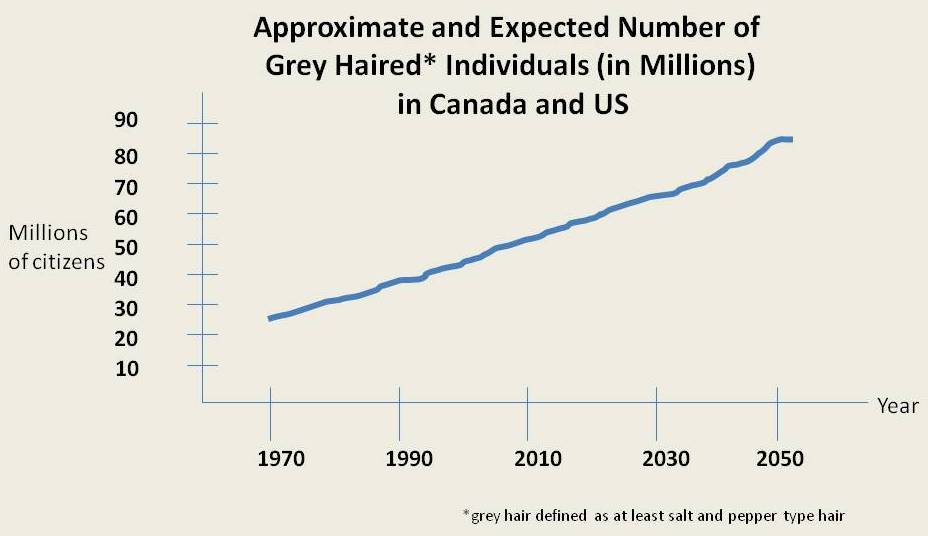Hair Greying and the 50-50-50 Rule
The process of hair greying is a fascinating process. (For my US friends, I’m talking about the “graying” of hair). I’ve lost count how many friends, family members and colleagues have commented about grey hair in the past week alone. Grey hair is common (and getting more common) so let’s talk about it.
I can’t clear up all the myths associated with grey hair in this blog. But the three most common myths are:
Plucking a grey hair causes more new ones to appear - False!
Individuals with grey hair are less healthy than those with darker hair - False!
Getting grey hair is related to stress - False!
What age do we start to grey?
The age that our hair turns grey is determined by several factors. The most important factor, by far, is our genetics. If there are alot of individuals in the family with early greying, there is a very good chance you’ll go grey early too. President Obama started going grey in his late 40s and he once remarked to the media that his own grandfather was grey by his late 20s.
The normal process of hair greying starts in the temples and then the crown. Caucasians starting greying first (sometimes in the 30s) followed by Asians (in the late 30s) followed by those with African descent (in the mid 40s). In general by age 50, about half of the Caucasian population has at least 50 % grey hairs. I refer to this as the “50-50-50 Rule:"
By age 50, about 50 % of the Caucasian population will have 50 % grey hair (commonly referred to as salt and pepper hair).
Rapid Greying (turning white overnight)
You may have heard stories of hair turning grey (or white) over night. These stories usually focus on the great deal of stress experienced by the person. What is going on here?
It's not actually possible for a dark hair to suddenly become white. Rather, what is happening is that the dark hairs are falling out leaving behind the white hairs to be seen. This pattern of sudden greying may be seen in patients with a condition called alopecia areata.
Premature Greying of Hair (PGH)
The term "premature greying" of hair refers to hair greying that occurs before the age of 20 in Caucasians, before 25 in Asian individuals and before 30 in black men and women. I occasionally evaluate patients in my clinic who start greying in the teens or twenties. These individuals usually have an underlying genetic or systemic abnormalities. Many, many factors influence hair greying. Thyroid abnormalities, B12 deficiency are just two examples of many conditions that cause early greying. Smoking too can cause early greying. In fact, a 1996 study in the British Medical Journal showed that smokers are about two to four times more likely to have grey hair.
Why does hair turn grey?
Hair doesn't actually 'turn' grey color, but simply loses its original color. Grey hair occurs because a pigment called melanin stops being pumped into newly manufactured hairs. It’s a specific cell called a melanocyte that is responsible for producing the melanin. The reasons why this change occurs is complex and continues to be the topic of research around the world.
Grey hair is actually different than the neighbouring darker hairs. In other words, a grey is not simply a normal hair that lacks pigment. The hair shafts seem to be different. Anyone who has grey hair will notice that the hairs are frequently wirier, coarser and less likely to hold pigment in hair dyes than the neighbouring pigmented hairs.
The Future of Grey Hair
The main treatment for greying hair, at present, is hair coloring and hair dyeing. At present, we spend over 2 billion dollars a year on hair coloring products in North America.
With an aging population, I’m sure we will soon see increasing demand for new ways to color our hair in years to come and even more focus on understanding the molecular and genetic process of greying. At present we have about 40 million individuals in the US and Canada aged 65 and over. By 2050, this number may be approaching 90 million.
What treatments will be available for grey hair in 2050?
I'll be following with you!
References of Interest
1. Premature grey hair and hair loss among smokers: A new opportunity for health eduation. British Medical Journal 1996; 313: 1616
2. Data in graph extrapolated from US Census Data. http://www.aoa.gov/agingstatsdotnet/Main_Site/Data/2010_Documents/Population.aspx
This article was written by Dr. Jeff Donovan, a Canadian and US board certified dermatologist specializing exclusively in hair loss.


